Rot

Compost all organic stuff such as food waste and dirty paper
Most garden waste and food scraps can go into a home compost bin.
Larger amounts of vegetation and other organic material can be taken to the
Sliverstream landfill, to the green waste drop off area.
Composting
Did you know that nearly half of all households in Upper Hutt already compost some or all of their organic waste?
Sending organic materials like kitchen scraps and garden ‘waste’ to landfill can cost you money. So, composting at home will save you money, plus you get the benefit of free garden fertiliser.
Get started with
Composting 101: Everything you need to know on the
Love Food hate waste website.
Wormeries
A Hutt Community Survey found that 39.2% of respondents said they compost their food waste at home in a composter and 9.4% compost their food waste in a wormery. In addition, 42.9% of respondents compost their green waste at home as well. Council is also doing its part to divert food waste from landfill.
You can easily make a thriving worm farm, year-round, indoors or out. It doesn’t take much space to build a worm farm that composts your kitchen waste, and it makes great fertiliser!
Worm composting is the process of using earthworms to break down food and garden waste. This is faster and more nutrient productive than normal composting. The earthworms produce castings which is sometimes called vermicompost.
Vermicompost contains five times more nitrogen, seven times more phosphorus and eleven times more potassium than ordinary garden soils. These key nutrients are essential for plant growth and cost lots of money to buy as garden fertiliser!
Get started with
Worm Farms 101: Everything you need to know on the
Love Food hate waste website.